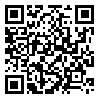Volume 12, Issue 1 And 2 (April & July 2005)
J Birjand Univ Med Sci. 2005, 12(1 And 2): 9-15 |
Back to browse issues page
Download citation:
BibTeX | RIS | EndNote | Medlars | ProCite | Reference Manager | RefWorks
Send citation to:



BibTeX | RIS | EndNote | Medlars | ProCite | Reference Manager | RefWorks
Send citation to:
Semnani S, Besharat S, Abdolahi N, Roshandel G, Danesh A, Hosseini A, et al . The assessment of possibility of using public data as a source of cancer registration.. J Birjand Univ Med Sci. 2005; 12 (1 and 2) :9-15
URL: http://journal.bums.ac.ir/article-1-49-en.html
URL: http://journal.bums.ac.ir/article-1-49-en.html
Sh. Semnani *1, S. Besharat2, N. Abdolahi2, Gh. Roshandel3, A. Danesh3, A. Hosseini3, D. Roshandel4, MJ. Kabir5
1- Assistant Professor, Department of Internal Medicine, Faculty of Medicine, Golestan University of Medical Sciences. Gorgan, Iran , sh_semnani@yahoo.com
2- General Practitioner, Researcher, Golestan Research Center of Gastroenterology and Hepatology
3- General Practitioner, Health Services
4- Student of Medicine
5- M.Sc. in Health Services Management
2- General Practitioner, Researcher, Golestan Research Center of Gastroenterology and Hepatology
3- General Practitioner, Health Services
4- Student of Medicine
5- M.Sc. in Health Services Management
Abstract: (12207 Views)
Background and Aim: Cancer registration based on hospital information, clinically and partaclinically derived data from health centers and labs, may have some shortcomings in recording all cancer cases, especially in the developing countries. Thus, in this study we tried to assess the possibility of using public
data concerning cancer incidence among their relatives as a complementary source of community-based cancer registration.
Materials and Methods: In this descriptive study, along with the annual census in rural areas in March 2004 a survey was performed in Golestan province to identify public awareness about cancer incidents in their community. People were asked about history of cancer in their close relatives during the last five years. Those who reported cancer in their relatives were also asked to name the main organ that was involved. A similar list was retrieved from the cancer registry by the department of health in Gorgan and cases with upper GI (esophagus and gastric) cancer diagnosis, from 2002 to 2003, were selected for the study. Finally, these two lists were matched to examine the accuracy of the collected data. For the statistical analysis of the collected data in these two years (i.e. 2002 VS 2003) Chi- Square test was employed and P<0.05 was accounted significant.
Results: We included 137 upper GI cancers with rural residential and known address into our study. Out of 137 cancer cases only 35 (%25.5) cases were reported by the relatives and among them only 20 (%57.1) relatives correctly reported the location of the tumor. Although we found a difference in correctly reporting cancer incidents by year of diagnosis (more correct cases during the second year than the first year), it was not statistically significant.
Conclusion: We found that taking history from relatives is not a reliable source of information for cancer registration and recommend a nationwide cancer registry to record all cancer related information at the time of diagnosis. This strategy will reduce the need for performing retrospective surveys to collect cancer related information.
data concerning cancer incidence among their relatives as a complementary source of community-based cancer registration.
Materials and Methods: In this descriptive study, along with the annual census in rural areas in March 2004 a survey was performed in Golestan province to identify public awareness about cancer incidents in their community. People were asked about history of cancer in their close relatives during the last five years. Those who reported cancer in their relatives were also asked to name the main organ that was involved. A similar list was retrieved from the cancer registry by the department of health in Gorgan and cases with upper GI (esophagus and gastric) cancer diagnosis, from 2002 to 2003, were selected for the study. Finally, these two lists were matched to examine the accuracy of the collected data. For the statistical analysis of the collected data in these two years (i.e. 2002 VS 2003) Chi- Square test was employed and P<0.05 was accounted significant.
Results: We included 137 upper GI cancers with rural residential and known address into our study. Out of 137 cancer cases only 35 (%25.5) cases were reported by the relatives and among them only 20 (%57.1) relatives correctly reported the location of the tumor. Although we found a difference in correctly reporting cancer incidents by year of diagnosis (more correct cases during the second year than the first year), it was not statistically significant.
Conclusion: We found that taking history from relatives is not a reliable source of information for cancer registration and recommend a nationwide cancer registry to record all cancer related information at the time of diagnosis. This strategy will reduce the need for performing retrospective surveys to collect cancer related information.
Type of Study: Original Article |
Subject:
Oncology
Received: 2006/09/6 | Accepted: 2016/03/10 | ePublished: 2016/03/10
Received: 2006/09/6 | Accepted: 2016/03/10 | ePublished: 2016/03/10
Send email to the article author
| Rights and permissions | |
 |
This work is licensed under a Creative Commons Attribution-NonCommercial 4.0 International License. |




